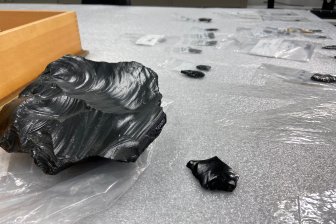The University of Waterloo is ending its partnership with Chinese tech firm Huawei to “safeguard scientific research” amid a sharpening focus on intellectual property protection, global espionage and foreign interference in Canadian society.

Huawei, whose technology has been banned from Canada’s 5G network, has been the subject of controversy for years due to a Chinese law that requires companies to share data with the state if asked. National security officials in western countries have raised fears that could allow spying.
Huawei has repeatedly said any concerns are unfounded.
“The University of Waterloo intends to complete our current contractual arrangements with Huawei which end before the end of 2023. This decision is part of our wider efforts partnered with multiple levels of government to safeguard scientific research at Waterloo,” said Charmaine Dean, vice president of research at the school.
“We recognize that this decision places some of our researcher’s cutting-edge work in jeopardy because they are losing reliable funding sources. Now is a time for Canadian businesses and governments to seize the opportunity to help us ensure that our talent and innovation pipeline remains productive now and in the future.”

Huawei did not immediately respond to Global News’ comment request by publication time.
Industry Minister François-Philippe Champagne said on Twitter on Thursday morning he was “glad to see that the University of Waterloo is taking the necessary steps to protect its research.”
“Research security is the responsibility of all partners involved,” he said.
Ontario Premier Doug Ford told reporters in Cambridge, Ont., that he supports the school’s decision, and that it “concerns me sometimes on some of the things we’re dealing with the communist Chinese government.”
The news was first reported by the Toronto Star on Wednesday.
In February, Champagne said Ottawa would stop funding grant applications if the researchers working on them were affiliated with a foreign military, state security entities or certain foreign state actors, citing a need to protect Canadian national security.

Ottawa’s announcement followed a report from The Globe and Mail in January that since 2005, 50 Canadian universities had extensive research collaborations with China’s military. The projects with China’s National University of Defence Technology included areas like quantum cryptography, photonics and space science, the newspaper reported.
While he made no mention of a specific state, a spokesperson with Champagne’s office confirmed the policy will include, but not be limited to, institutions and entities in China.
The research partnership between Huawei and the University of Waterloo, one of Canada’s top research universities, began in 2016.

At the time, the school said it had signed an agreement with Huawei on a “strategic research partnership that will serve as a framework for existing and future investment.”
The research collaboration agreement between Huawei and the University of Waterloo was to establish a framework for partnerships in research and development, including cloud computing, next-generation communications, data management and data analytics.
That deal was built on several research initiatives in 5G-related project areas between Huawei and the university. Huawei planned to invest $3 million over three years to develop research products.
Canadian relations with China have been uneasy for several years, intensifying in recent months over allegations of attempts to influence and interfere in Canadian affairs.

Most recently, The Globe and Mail reported on Monday that Beijing’s intelligence service allegedly sought to target Conservative MP Michael Chong and his family in Hong Kong, citing a top-secret document and an anonymous national security source. The Globe also reported a Chinese diplomat who remains in Canada was allegedly involved.
That news spurred Prime Minister Justin Trudeau to order the Canadian Security Intelligence Service to inform the government if there are threats made against any MP or their family — regardless of whether they are considered credible.
China’s Toronto consulate-general said on Thursday that the report of consular officers “coercing” Chong and his family has “no factual basis and is purely baseless,” further claiming Canadian media and politicians have ulterior motives. Foreign Affairs Minister Melanie Joly ordered China’s ambassador to be summoned over the report.

Trudeau has been under pressure to order a public inquiry into the allegations of Chinese interference, but instead tapped former governor general David Johnston to make that call as Ottawa’s special rapporteur.
Johnston will have until May 23 to decide whether a public inquiry is needed, or whether a different kind of independent process such as a judicial review would be more appropriate.
— with files from Reuters




Comments